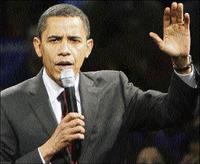
Senator Barack Obama addressing delegates at a run-off rally.WASHINGTON, DC (AP):
As Barack Obama appears poised to win the Demo-cratic presidential nomin-ation, the national party faced the daunting task of dealing with two states stripped of their delegates and avoiding a rift that could hurt the party's chance at the White House.
The party's rules and bylaws committee met Saturday to decide how to divvy up Michigan and Florida delegates between Obama and rival, Hillary Rodham Clinton.
The states' primaries were not included in the overall delegate count because they defied the national party by holding their nominating contests too early.
The challenge is to "come together at the end of the day and be united," Democratic Chairman Howard Dean told the committee at the start of Saturday's meetings.
The committee's decision is unlikely to fully satisfy anyone, but the party is seeking to avoid angering loyal Clinton supporters and alienating two states that could be crucial in the November election against Republican nominee-in-waiting John McCain.
The fate of Michigan's 128 pledged delegates is the more complicated of the two situations. The state's January 15 primary was not recognised by the national party, so Obama and other candidates took their names off the ballot. Clinton left her name on and won with 55 per cent of the vote to 40 per cent for 'uncommitted'.
The Clinton campaign has insisted that Obama is not entitled to any pledged delegates from Michigan. But Obama campaign manager David Plouffe said such an outcome is unacceptable to the campaign and "I don't think is a position that people find terribly reasonable."
Dividing the delegates
Plouffe said the Obama campaign was willing to give Clinton the edge in delegates from the two states, but they were not willing to accept the Clinton camp's hard-line stance that all the 368 delegates should be fully seated in accordance with the January elections.
"We have both fought hard throughout the country, both of us, for delegates, and the fact that we're willing to essentially cede her delegates we do not think is an insignificant gesture on our part," Plouffe said. "But we're willing to do this in the interest of trying to bring this to a close so we can focus on the general election."
Several Democratic officials and committee members interviewed by The Associated Press said a consensus seems to be forming over how to divvy up the Florida delegates. Party rules call for stripping half the delegates of a state that violates regulations. Nearly 2.3 million Democratic primary votes were cast in the two states.
Clinton has cited her victories in the two states as part of her push to argue that she leads Obama in the popular vote based on a count of selected primary and caucus contests, even if his all-important delegate lead is overwhelming.
"It's important to send the right signals to them and the people living in those states that we Democrats value those states, value those voters and want them as full partners in a general election in assembling 270 electoral votes," said Clinton strategist Harold Ickes, a member of the rules committee.
GATHERING
The former first lady's supporters rallied outside the Washington hotel three miles (five kilometers) north of the White House where the committee was meeting, putting pressure on the national party amid fears that the already grueling nomination battle will split the party. Obama has discouraged a counterprotest.
Shortly before the meeting began, about 500 people had gathered on a sidewalk and cheered loudly as cars turned into the driveway. They waved homemade signs, blew horns and chanted "Every vote!"

